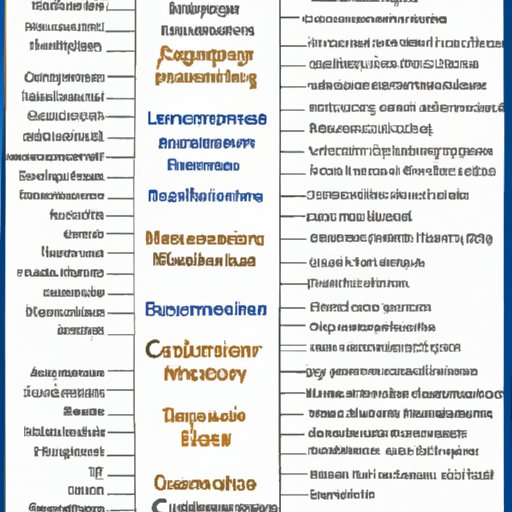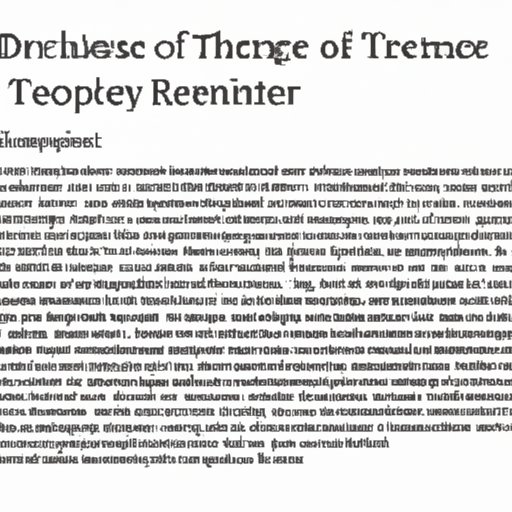Introduction
Theme is a central idea or message within a literary work that serves to unify and give meaning to the story. It is often expressed through symbols and motifs, as well as through the characters and plot. The purpose of this article is to explore the role of theme in literature and how it impacts storytelling, character development, and reader perception.
Defining Theme and Its Role in Literature
At its core, theme is a unifying concept or message that ties together the elements of a story. It is often expressed through symbols and motifs, as well as through the characters and plot. In literature, theme is used to convey the author’s message or point of view. As author Richard Nordquist states, “Theme is an element of literature that binds together various essential elements of a story, such as characters, setting, tone, and imagery, to create a coherent whole.”
Themes are often subtle and require readers to think critically to uncover them. They can be explored through the characters’ actions and dialogue, as well as through symbols and motifs. Authors use theme to express their message and evoke emotion in their audience. For example, a theme of love may lead to a story about two people overcoming obstacles to be together, while a theme of loss may lead to a story about a character coming to terms with a loved one’s death.

An Overview of Common Themes in Literary Works
Love is a common theme in literature, as it is one of the most powerful emotions that humans experience. It is often explored through stories about star-crossed lovers, relationships between family members, and the search for true love. Loss is another common theme, as it is something that all humans must come to terms with at some point in their lives. This theme is often explored through stories of grief, death, and letting go.
Coming of age is another popular theme in literature. This theme is often explored through stories of young people who are transitioning from childhood to adulthood and learning important life lessons along the way. Good vs. evil is another common theme, which is often explored through stories of conflict and struggle between opposing forces. Finally, identity is a widely explored theme in literature, as it is something that many people struggle with throughout their lives.

Exploring the Symbolic Meaning of Themes in Literature
Symbols and motifs can be used to express a theme in literature. These elements can add depth to a story by providing a symbolic representation of the theme. For example, a symbol of light may represent hope, while a symbol of darkness may represent despair. By examining these symbols, readers can gain insight into the deeper meaning of a text.
In addition to symbols, authors can use subtextual meanings to convey theme. These messages can be expressed through the characters’ dialogue, actions, and reactions. By studying these elements, readers can gain a better understanding of the author’s intended meaning.
Analyzing Character Development Through Theme
Characterization is one of the most important elements of storytelling, as it helps bring characters to life and allows readers to connect with them. Characters can be used to express theme by showing how they grow and evolve over the course of the story. For example, a character who starts out as selfish and self-centered may learn to become more compassionate and understanding through the course of the story, thus expressing the theme of growth and transformation.
Authors can also use characters to explore themes of conflict and tension. This can be done by showing how different characters have different values and beliefs, and how these differences can cause tension and conflict between them. By examining these interactions, readers can gain insight into the themes being explored in the work.
Examining How Authors Use Theme to Enhance Storytelling
Theme can be used to create suspense and tension in a story. By introducing characters with conflicting ideologies or values, authors can create a sense of tension and anticipation in the reader. This can be done by creating a situation where the reader is unsure of how the characters will resolve their differences. In addition, theme can be used to add depth to a narrative by exploring complex ideas and philosophical questions.
Theme can also be used to create empathy in a reader. By exploring difficult topics such as death, loss, and suffering, authors can evoke strong emotions in their readers. This can help create a connection between the reader and the characters, as well as provide insight into the human condition.

Investigating the Impact of Theme on Reader Perception
Theme can influence a reader’s interpretation of a text. By exploring certain themes, authors can shape the way readers perceive their stories and characters. For example, a story with a theme of justice may lead readers to sympathize with certain characters and condemn others. In addition, a story with a theme of redemption may lead readers to have hope for the future and believe in the possibility of change.
Theme can also influence the way readers respond to a text. A story with a positive theme may lead readers to feel uplifted and hopeful, while a story with a negative theme may lead readers to feel disheartened and discouraged. By exploring different themes, authors can evoke a range of emotions in their readers.
Conclusion
Theme is an essential element of literature that serves to unify and give meaning to the story. It is often expressed through symbols and motifs, as well as through the characters and plot. Theme can be used to enhance storytelling, create tension, and evoke emotion in readers. It can also influence reader perception and response by shaping the way readers interpret and respond to a text. Ultimately, theme is an integral part of literature that helps to give it depth and meaning.
(Note: Is this article not meeting your expectations? Do you have knowledge or insights to share? Unlock new opportunities and expand your reach by joining our authors team. Click Registration to join us and share your expertise with our readers.)
